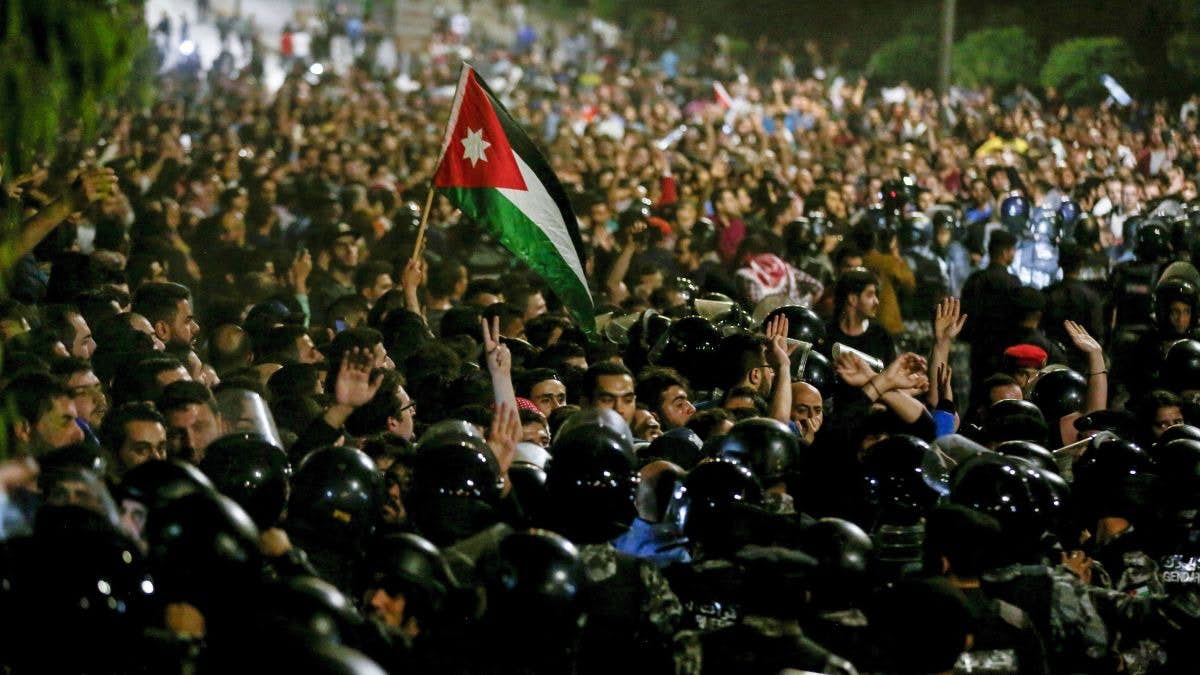NEW YORK (June 14, 2018) — Last week, Jordan’s newly-appointed prime minister, Omar al-Razzaz, announced that the government would repeal a tax law that had prompted widespread protests and dissent in early June. Though the announcement addresses protesters’ immediate demands, it does not address the underlying cause of the protests: the lack of sufficient political representation and free political discourse. HRF calls on al-Razzaz and King Abdullah II to initiate political reforms that would grant Jordanian citizens civil and political rights, in accordance with international legal standards.
“It took a full week of protests and strikes for King Abdullah to recognize the will of the people. In reality, citizens should have many avenues to express political opinions: in independent newspapers, in civil society groups, at the voting booth. These avenues are severely limited in Jordan today,” HRF President Thor Halvorssen said.
Jordan’s political unrest began on May 30, when the Jordanian government introduced a draft law that would have increased income taxes at a time of economic decline. Protesters began by demanding a repeal of the tax plan, but quickly went on to address other issues, including government corruption and economic hardship. In response, King Abdullah called for a national dialogue and appointed a new prime minister, Omar al-Razzaz. On June 7, al-Razzaz announced that the draft tax law would be withdrawn.
King Abdullah inherited the throne on February 7, 1999. Although he has written extensively on his desire to build a vibrant Jordanian democracy, Jordan remains a fully authoritarian regime today. The most important executive office — the king — is unelected, as are all representatives in the Senate (the upper house in the legislature). The only elected officials at the national level are in the Chamber of Deputies (the lower house), which cannot enact laws without the approval of the Senate. The king has extensive control over the government: he appoints members of the Senate, can appoint and dismiss the prime minister, and can dissolve the legislature whenever he deems necessary. And though King Abdullah writes that the Jordanian people should make their “voices heard in the election campaigns” and by “holding our elected officials to their commitments,” his regime undermines political parties and campaigns and places strict limits on free speech and press freedom. Activists now fear that a new and vaguely worded cybercrime law will be used as weapons against anyone who criticizes the government.
“Jordan’s royal family usually responds to protests in the ‘right’ way: peacefully and with promises of reform. King Abdullah II himself has stated, eloquently and repeatedly, that he believes in democracy and freedom — but each time, he fails to follow through and make the needed changes,” Halvorssen added. “If the regime is serious about letting Jordanians ‘express themselves’ politically, then it must give up its authoritarian control and hand power over to the voters. I urge King Abdullah to make good on his promises.”
Previous protests have also prompted King Abdullah to initiate reforms and appoint new officials. During the Arab Spring, thousands of Jordanians participated in the “day of anger,” or “day of rage,” which was at the time the largest demonstration in Jordanian history. King Abdullah responded to the protests by dismissing the prime minister and appointing a new one, who was soon replaced by yet another prime minister after failing to deliver speedy reforms. In total, Jordan had five prime ministers between 2011 and 2012, and six years later, the country is still ruled by an authoritarian regime. Jordan’s history reveals a pattern — or worse, a strategy — of responding to protests with cosmetic changes that calm the streets but do not threaten the king’s control over the state.
However, activists are optimistic that this round of reforms will be different. In conversation with HRF, a leading Jordanian activist (who asked to remain anonymous) explained that protesters have faith that the new prime minister will follow through on his promises because of his professional background and frequent criticism of government policies. Also, she noted that these protests are unlike previous social movements because they were unprecedented in scale and activated a broader sector of Jordanian society, including youths, the middle class, unions, and professional associations. Union leaders say they will return to the streets if the prime minister does not implement reforms.
“Jordan is one of the most economically free countries in the world and many assume this means that Jordan’s government is politically open, too. In fact, it’s the opposite,” explained Celine Assaf Boustani, HRF’s international legal associate specializing in the Middle East. “Jordan lacks true political representation and a free press, and relies on vaguely worded laws to criminalize dissent. Jordanians cannot speak freely or decide on their political destiny. In these protests, they are forcing their leaders to recognize their political will.”
The Human Rights Foundation (HRF) is a nonpartisan nonprofit organization that promotes and protects human rights globally, with a focus on closed societies.
For media inquiries, please contact media@humanrightsfdn.wpengine.com.
